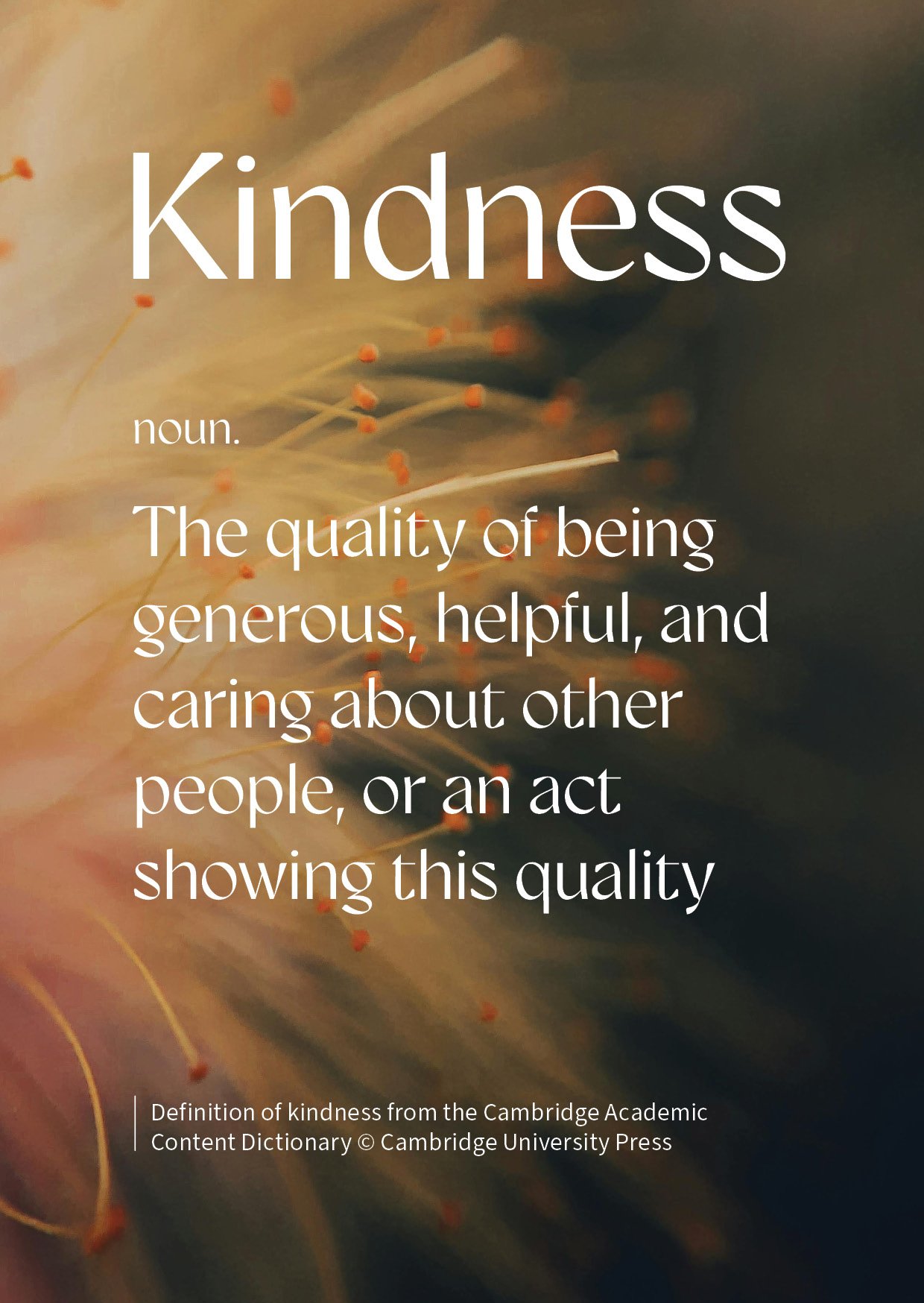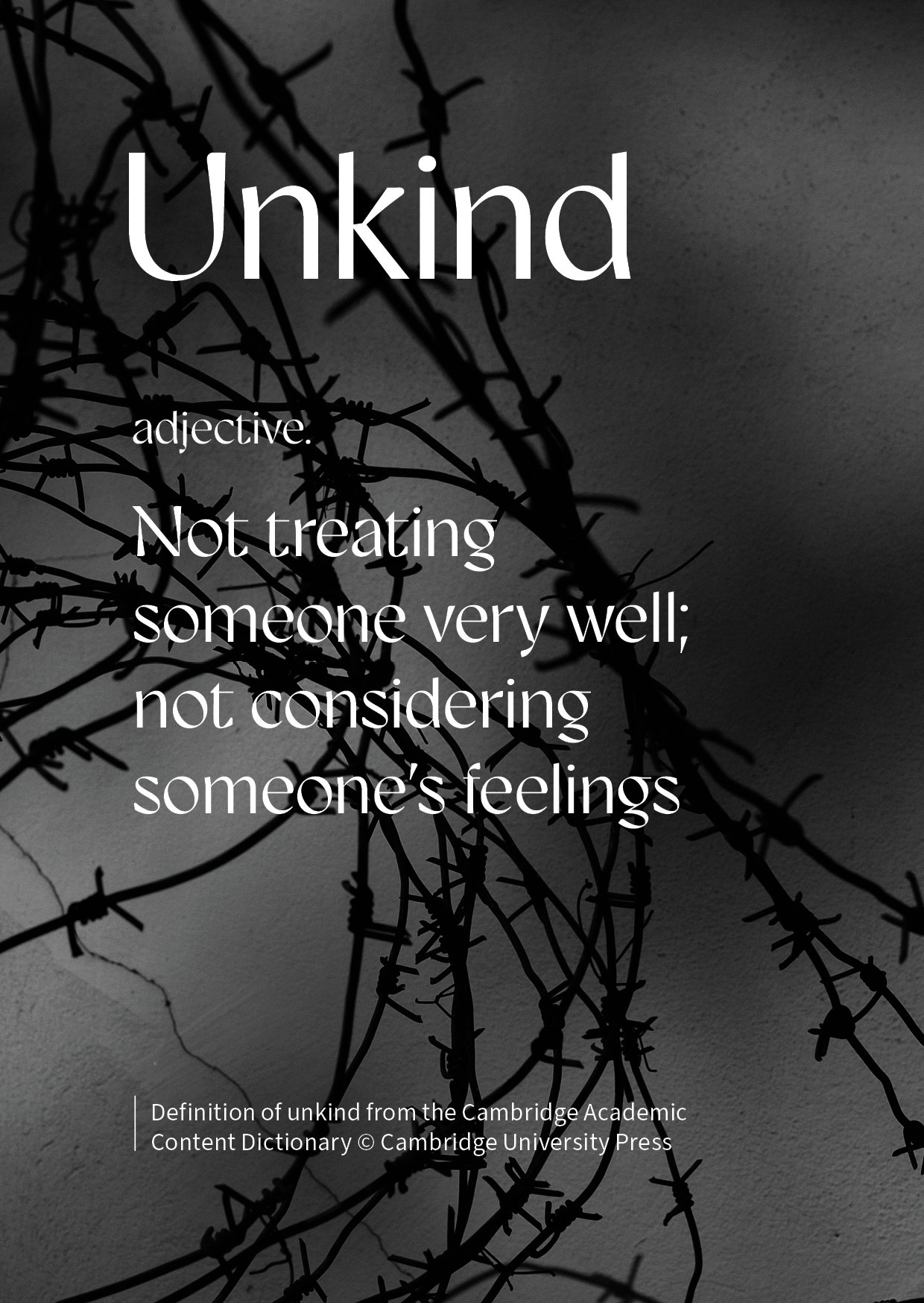-

Forgiveness
Forgiveness doesn’t mean forgetting. It’s about grace. It’s not about an eraser. You don’t erase people hurting you. You recognise that you hurt other people too. And you offer the same kind of grace that you want. And you move on but you don’t sign up for more of it from that relationship. You…
-

The definition of kindness
Kindness is the quality of being generous, helpful, and caring about other people, or an act showing this quality.
-

Is individuality over-rated in Western cultures?
In Western cultures, individuality is highly valued, with an emphasis on personal autonomy, self-expression, and individual rights. On one hand, this emphasis can support mental health by promoting a sense of agency and empowerment, which are essential for well-being. It fosters the idea that people should feel free to express themselves, pursue their own…
-

What is self-sabotage
Self-sabotage refers to patterns of behaviour or thought that actively prevent someone from achieving their goals or experiencing success, even when they consciously want those things. It’s often driven by subconscious fears, insecurities, or unaddressed emotional conflicts. While the person may outwardly desire a positive outcome, they unintentionally engage in actions that derail their…
-

What is psychological blind spot
In psychology, a blind spot refers to an area of one’s consciousness or awareness where a person is unable to see or recognise certain aspects of themselves, their behaviour, or their perceptions. These are usually unconscious patterns or biases that can affect our decisions, relationships, and self-image, often without us realising it. Key features…
-

What is self-awareness
Self-awareness is the ability to recognise and understand your own thoughts, emotions, behaviours, and how they impact both yourself and others. It’s essentially the process of becoming more conscious of who you are — your strengths, weaknesses, values, beliefs, desires, and triggers. Etiam placerat velit vitae dui blandit sollicitudin. Vestibulum tincidunt sed dolor. There…
-

What does healthy compromise looks like
In a healthy interpersonal relationship, compromise is all about finding a middle ground where both parties feel heard, respected, and valued. It’s not about one person giving in completely, but rather about negotiating in a way that both individuals feel they’ve made meaningful contributions to the solution. Here’s what healthy compromise generally looks like:…
-

Why it’s so hard for some people to compromise
There can be several reasons why some people find it hard to compromise, and they often stem from deeper psychological, emotional, or even developmental factors. Here are a few possible explanations: 1. Fear of losing control or autonomy Some individuals have a strong need to maintain control over their environment and decisions. Compromise can…
-

How to loosen the pressure to ‘repay’ in the traditional sense
Shifting from a transactional mindset to one that leans more on reciprocity can be freeing and help build stronger, more genuine connections with others. Here are some ideas that can help people embrace reciprocity without getting stuck in a transactional way of thinking: 1. Shift the focus to shared values, not exchange Instead of…
-

Reciprocate vs. repay
Although the words ‘reciprocate’ and ‘repay’ are related, these are two different approaches people handle support or help. While ‘reciprocity’ is more about mutuality and can be based on trust and shared goodwill, ‘repayment’ is about explicit exchange and often comes with expectations of fairness or equal return. Etiam placerat velit vitae dui blandit…
-

Why can’t I relax around others
The inability to relax around others can stem from a combination of personality traits, past experiences, biological factors, and social conditioning. It’s often about how safe someone feels in the moment, and that feeling of safety can vary greatly depending on the person and the context. Some of the most common reasons include: 1.…
-

Raised by authoritarian parents
People who were raised by authoritarian parents — those who typically enforce strict rules, demand unquestioning obedience, and offer little warmth or emotional support — often develop certain behaviours and emotional patterns as a result of this upbringing. The authoritarian style of parenting creates an environment where control and discipline are prioritised over emotional…
-

What does authoritarian parenting look like in daily life
Authoritarian parenting is a strict, control-focused approach to raising children. The key themes are: Etiam placerat velit vitae dui blandit sollicitudin. Vestibulum tincidunt sed dolor. In daily life, it often involves parents being highly demanding and expecting obedience without question. They tend to prioritise rules and discipline over warmth and emotional connection. Here’s what…
-

What causes ‘approach and avoid’ behaviour
‘Approach and avoid’ describe a pattern where someone may simultaneously crave intimacy and connection while also fearing it, leading to a push-pull dynamic in personal relationships. It’s often linked to attachment styles, emotional regulation, underlying fears, or unmet needs. Here are some reasons why this might happen: 1. Attachment styles Etiam placerat velit vitae…
-

Exploring our ‘usual self-presentation’
Knowing our usual self-presentation is about becoming aware of the patterns in how we behave, think, and feel in various situations. Essentially, it’s our natural way of presenting ourselves to the world when we’re not consciously altering our actions to fit in or please others. Here are a few ways we can start to…
-

What is psychological shape shifting behaviour?
Psychological shape-shifting refers to a type of behavioural pattern where an individual adapts or changes their personality, actions, or attitudes depending on the social context or the people they are interacting with. This can be done consciously or unconsciously, and it often involves altering one’s usual self-presentation to fit in with different environments or…
-

What is psychodynamic merging
Psychodynamic merging refers to a psychological process where a person starts to blend their identity with that of someone significant in their life — usually a parent, partner, or other important figure. This merging can manifest in various ways, and it often happens unconsciously, so individuals may not even be aware that it’s occurring.…
-

What does an enmeshed family look like?
An enmeshed family is one where the boundaries between family members are overly blurred, leading to a lack of individuality and independence. In these types of families, emotional connections are so intense and intertwined that it can be difficult for members to maintain a sense of self outside of the family unit. Here are…
-

Why conflict feels so scary for some
Conflict is a complex issue, and it can feel really scary for some people due to a combination of psychological, emotional, and past experiences. Here we explore the underlying reasons: 1. Fear of rejection or abandonment For many, conflict triggers a deep-seated fear of being rejected or abandoned. If someone has experienced rejection or…
-

How to stop feeling responsible for others’ feelings
Feeling responsible for others’ feelings is a very common struggle and is often linked to things like people-pleasing tendencies, perfectionism, or even trauma history. It can create a lot of emotional burden, because we internalise others’ moods or reactions as though they are our job to manage. But in reality, while we can offer…
-

Why some of us take responsibility for other people’s feelings?
Taking responsibility for other people’s feelings is a common pattern, and it can stem from several psychological and emotional factors. Here are some reasons why this might happen: 1. Early attachment patterns In childhood, the way our emotional needs were met by caregivers often shape how we relate to others emotionally as adults. If…
-

How to deal with the silent treatment
Dealing with the silent treatment, especially from someone we care deeply about, can be emotionally painful and confusing. It’s often used as a way of expressing frustration, anger, or a need for space, but it can leave the recipient feeling isolated, unheard, and powerless. Here are some healthy ways to navigate this situation: 1.…
-

Do we have codependent tendencies?
Codependent tendencies refer to patterns of behaviour in which a person tends to prioritize the needs, desires, and well-being of others over their own, often to the point of neglecting their own emotional, physical, or mental health. This dynamic can develop in various types of relationships, but it is typically common in intimate partnerships,…
